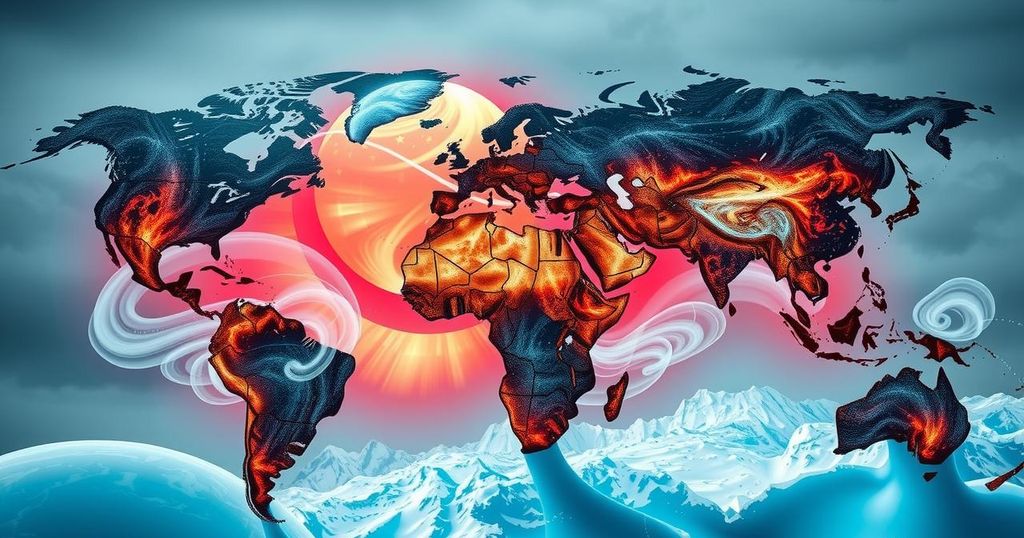In 2024, global impacts of climate change intensify, marking the year as the warmest on record, according to the WMO. The increase in greenhouse gases exacerbates weather extremes, leading to significant loss of life and economic damage. Call to action for enhanced emission reductions is emphasized as WMO marks its 75th anniversary in 2025, focusing on greater international cooperation and climate adaptation strategies.
In 2024, the world is experiencing severe impacts from climate change, characterized by extreme weather patterns and unprecedented temperature highs. According to the World Meteorological Organization (WMO), this year is projected to be the warmest on record, culminating a decade marked by exceptional heat driven by human activity.
The rise in greenhouse gas levels has locked in additional warming, intensifying the urgency to address climate change. In his New Year message, UN Secretary-General António Guterres noted, “Today I can officially report that we have just endured a decade of deadly heat. The top ten hottest years on record have happened in the last ten years, including 2024.”
He emphasized the need for immediate action to avert what he termed a climate breakdown: “We must exit this road to ruin — and we have no time to lose. In 2025, countries must put the world on a safer path by dramatically slashing emissions.”
The WMO plans to release its global temperature figure and full climate report in the early months of 2025, amid increasing reports reflecting the ramifications of climate change. WMO Secretary-General Celeste Saulo reiterated the significant threats posed by climate change, stating, “Every fraction of a degree of warming matters, and increases climate extremes, impacts and risks.”
Throughout 2024, the world witnessed record rainfalls, catastrophic flooding, and extreme heat across numerous regions. Notably, climatic events led to substantial loss of life and economic damage, particularly from tropical cyclones and severe wildfires. Furthermore, a critical report from World Weather Attribution revealed that climate change exacerbated 26 out of 29 weather events in 2024, resulting in thousands of fatalities and widespread displacement.
In response to these alarming statistics, the WMO is spearheading multiple initiatives to enhance climate adaptation and mitigation strategies. A group of international experts gathered to advance a unified approach to combat the rising risks associated with extreme heat, responding to the UN Secretary-General’s urgent call for action.
As WMO approaches its 75th anniversary in 2025, the focus will prominently shift toward the cryosphere, with an emphasis on glacier preservation and the importance of monitoring climate trends. A recently issued report emphasizes that climate change contributed to an additional 41 days of dangerous heat in 2024, impacting both human health and ecosystems significantly.
The phenomenon of climate change has become increasingly critical, impacting global weather patterns and temperatures. The year 2024 marks a pivotal moment as it is anticipated to be the hottest on record, a situation exacerbated by persistent greenhouse gas emissions. Numerous international organizations, including the WMO and the United Nations, are actively engaged in efforts to address these challenges through awareness, policy advocacy, and climate services aimed at adaptation and mitigation. Highlighting the urgency of action, international leaders are pressing for comprehensive measures to curtail emissions and enhance global cooperation.
In conclusion, the year 2024 stands as a stark reminder of the escalating impacts of climate change, with record temperatures and extreme weather events underscoring the need for urgent action. The continued rise in greenhouse gases necessitates immediate and coordinated efforts to reduce emissions and bolster climate resilience, as emphasized by international leaders. The WMO’s commitment to monitoring climate conditions and facilitating global cooperation will be crucial as the world navigates these unprecedented challenges.
Original Source: reliefweb.int






